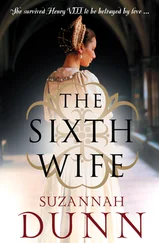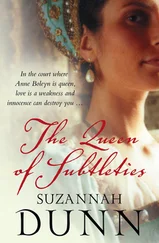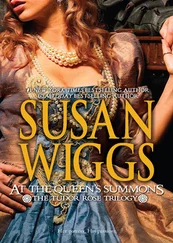His walking around the fountain alerted her to his presence, though, and she came towards him at a brisk pace – how she managed it in that dress, he didn’t know. She advanced with authority; no wariness in this approach to a strange man in the queen’s own garden. He braced himself. From her stature – tiny – he’d assumed she was not much more than a girl, but now he could see she was in early middle age, folds bracketing her mouth, a line between her eyebrows, and a dustiness to her pallor. He was surprised to have made the mistake, because she had none of the softness of a girl; her shoulders were sharp and movements abrupt. She was so English-looking: fireside-dry skin, ashen but flushed, as if it were scalded. The smallness of her colourless eyes was accentuated by their stare. Due to genuine short-sightedness, he judged the stare to be, rather than any attempt to intimidate him.
She was all dress, parading what must’ve been years of other people’s close work, and all of it layered, furred, edged. She’d probably taken until this late in the day to get dressed. For all the effort, though, the result was disappointing. Curtains , was what came to Rafael’s mind. Not just the fabrics – splendid, yes, but sombre – but also the lack of shape. She was dressed in the old-fashioned, softer-lined English style – no Spanish farthingale – and on her thin frame the clothes were shapeless.
She asked him something and, small though she was, her voice had no squeakiness to it; it was unexpectedly deep. And officious though her approach might have been, there was no unpleasantness in her manner. She’d sounded straightforward, no nonsense, which gave him some confidence. He greeted her and stated his name, hoping he wouldn’t have to say much more. Surprisingly, she came back at him in what he recognised as Aragonese: ‘You’re Spanish?’
An English speaker of a Spanish language! He confirmed that he was indeed Spanish.
‘Welcome to England,’ she said in Aragonese, touchingly serious, which made him smile, although nothing similar came back from her. He wondered at her connection with Spain – she was so very English-looking, English-dressed, but her accent had been good and there’d been a naturalness in how she’d spoken. Not like an English person trying a few words of Spanish. Surely she did have some connection with Spain. She asked him something else but he didn’t grasp it – he couldn’t speak Aragonese. ‘Castilian?’ he asked her; he’d be able to converse in Castilian.
She shook her head, regretful. ‘French?’
No.
‘Latin?’
He could read Latin but had never been able to speak it.
In English, she said, ‘I speak French to my husband – he understands French – and he speaks Castilian to me, because I understand a little.’ She gave an exasperated roll of her eyes but, Rafael detected, she was proud of their complicated arrangement. She looked expectantly at him; he considered how best to convey what he was up to.
‘For the sun,’ he said in Castilian, gesturing – pointlessly – at the sky, then remembering the vertical dial on the gallery wall and indicating that instead. ‘For the queen, from the prince.’
‘Ah.’ Interest – approval – shone in her eyes.
Then came an interruption: a second lady emerging from that same doorway. This lady was younger, prettier, altogether lighter, a breath of fresh air, and she was all a-bustle, giving the impression that she’d been following the first lady and failed to keep up: ‘Oh!’ – found you . She collected herself, exhaled hugely, a hand pressed to her breastbone to steady her heart, and then she dropped into a deep curtsey.
Rafael understood at once. His own heart halted and restarted with a bang, his blood dropped away then beat back into his ears. Time had taken a wrong turning and was away before he could retrieve it and make good; he’d never, ever be able to make this good. He couldn’t believe what he’d done. He simply couldn’t believe it. He couldn’t have done it: no one could, no one , not even a child. Especially not a child: a child would have had an instinct. No one but he could have been so stupid. What exactly was it that he’d missed? He’d missed something clear and simple, he’d been busy thinking of something else, perhaps too busy translating. All he could think, now, was that, despite the finery, she’d seemed so ordinary. Her face was ordinary, and she spoke ordinarily. But, then, what did he know of how a queen would look and speak?
What now? He had no idea, absolutely no idea how to save himself. Everything – courage, imagination – failed him and he stood there like, he felt, a small child. She’d known, hadn’t she: she’d known that he had no idea who she was, and she hadn’t enlightened him. How, though, really, could she have maintained her dignity while she enlightened him? She was talking cheerfully to the other woman, the new arrival – ‘Mrs Dormer’, she called her – indicating Rafael as she did so. Mrs Dormer’s eyes had a mischievous glint. She knew. So, it had been obvious. It was that bad. Even though she hadn’t been there, from the distant doorway she’d somehow guessed from his demeanour – presumably from his lack of deference – that he hadn’t known he was in the presence of the queen. He longed for her – for both of them – to go, and then perhaps there’d be the tiniest chance he could pretend to himself that it had never happened. He would never, ever tell anyone. Would they? He wasn’t sure of the merry-looking Mrs Dormer. It was a funny story, to her, and he sensed she liked a funny story. He’d have begged her then and there, if he’d known how. If she did tell, what kind of trouble would he get into? I’ll get sent home for this : it flashed across his mind, lifting his heart.
Both women were waiting on him, now, politely interested. He did his utmost to look as if he were of service. Everything had changed: he was no longer a sundial-designer being waylaid by some woman, but a man being granted a personal audience by the queen of England. And he did what he should have done at the beginning: bowed fulsomely, abjectly, all the time horribly aware of the merry-looking lady witnessing it. Graciously, the queen was declining to acknowledge that anything had been amiss; she continued speaking, wishing him well with his work. She looked up into the sky and a note of apology came into her voice:‘… no sun here …’ she was saying. And then they headed back to the door, the queen leading the way at a jaunty pace.
Watching her go, Rafael felt a pang. She’d seemed so pleased that he was Spanish, but what, until now, had Spain ever done for her? Her Spanish mother had been set aside by the king in favour of a mistress, and she herself – an only child, twelve years old – had been taken from her, for ever kept from her and disinherited. And what had her uncle, the Spanish king, done? He’d expressed his concern and sympathy, his disgust and outrage, and he’d done so time and time again for years and years. But what had he actually done? And then, during her little half-brother’s reign, she’d been persecuted for her religion, prevented from practising it, harassed, hounded and vilified, and what had her uncle done? Expressed more concern and sympathy, more disgust and outrage. She and her mother were just women, after all; and it was just England, after all. He could never have gone to war for them.
Watching her go, he found it hard to believe that she was the woman over whose accession to the throne, he’d heard, there’d been such jubilation: such jubilation, it was said, as had never before been seen in England. She’d spent most of her life shut away but then, when it mattered, the English people – making much of their sense of fair play – had rallied and championed the old king’s eldest daughter as rightful heir. Rafael had seen her as ordinary when she’d stood talking to him, but, also, he now saw, nothing could be further from the truth. Her bearing, as she walked away, was regal.
Читать дальше












